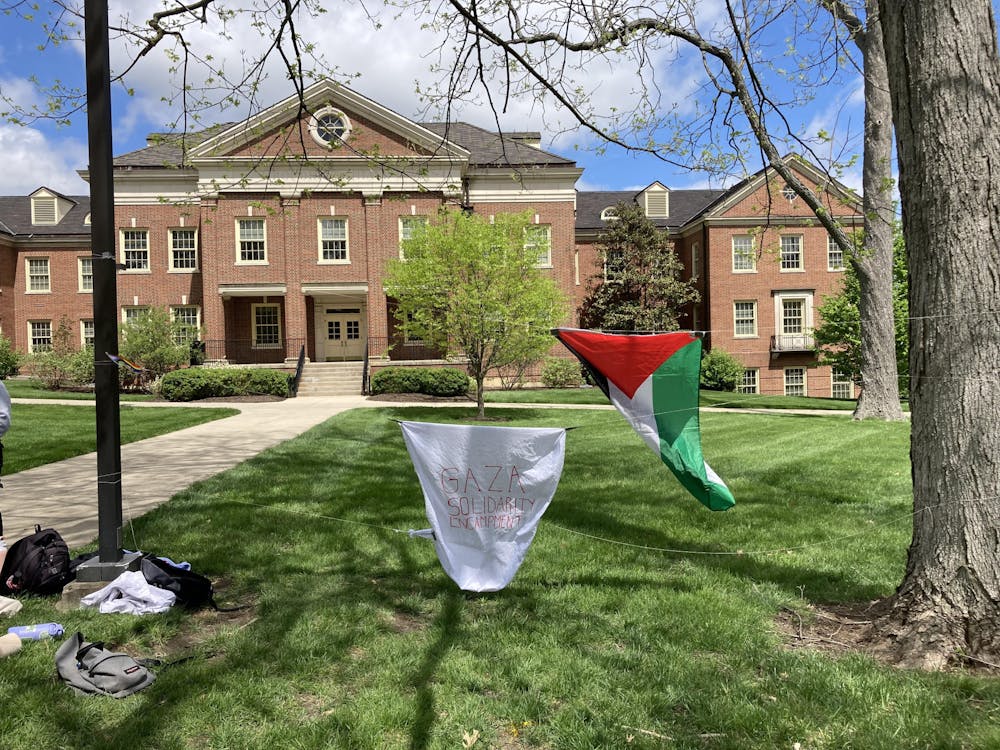War has raged for a year in the Holy Land. Over 40,000 Palestinian civilians in Gaza are dead, half of them being children. Around 100 Israeli hostages remain in captivity. The land of Gaza has been decimated by the indiscriminate bombing and invasion of the territory by Israeli forces aided by American arms. The thousand fatalities from the Islamist Hamas government’s unprecedented and brutal raid against Israeli civilians may be the first of many, as tensions escalate between Israel and the various Iranian client groups encircling it. These are the facts of the conflict half a world away and on our doorstep.
The conflict was an inevitable intruder into the politics of American academia. More unprecedented were the series of student encampments that flashed across universities nationwide. Despite seeing these events (almost incessantly) on the internet, it was an entirely different experience to have the turmoil walk before you and physically encounter a pro-Palestine student encampment.
Observing from afar (having seen enough footage to know such protests could escalate from nothing to become brawls or crackdowns), the eerie feeling of seeing Miami University enter the list of schools challenging to address the conflict, and its costs, was not lost on me.
Particularly, the symbolism of the march starting from Western Campus (where the Freedom Summer bus riders had trained a half-century earlier) going unnoticed by the larger flow of the university felt both amusing and surreal. Regardless, it would be at the literal center point of Miami’s campus that I would see our page in the perilous story be written.
At the Seal, I, along with other near-neutral onlookers, would watch the swirl of events unfold around us. Among the pro-Palestine protesters, who had entered the circle with high-pitched slogan chants and now unpacking tents or camped about in sullen silence, were classmates I had known. On the other side were friends talking amongst each other but holding across them the flag of Israel.
Yet here I was between them, hovering with friends on this side and that. Tension was light between us at that point, us being more curious at the spectacle that emerged rather than concerned. Someone had even brought a Vatican City flag, an apparent third position to the two-state conflict.
Such lightheartedness was a far cry from the ongoing battles across the country, as Columbia’s students barricaded within halls and UCLA’s encampment erupted into a disturbing micro-war with rocket-shooting counter protesters storming the barricades.
Regardless, the tensions at Miami were still palpable, as more sullen supporters of each cause eyed each other from across the physical divide of the Seal. With police and guards between them, all attempts at conversation ended in soured silence and the mutual fear of retaliation. This contrast between fear and passion for justice would endure over the following day.
The near theatrical, dramatized stand-off of the Palestine encampment against the heart of Oxford frankly did not live up to its own expectations. Despite the floodlights and cop cars, the day-long episode was, from all appearances, more a brooding commune of leftists than a staging ground of defiance. Without even counter-protestors to attend them in that second and final day, the encampment’s presence was a diminishing one.
Around that same time, I had a call with my mother where, inevitably, this diminished demonstration was discussed. When the war first broke out, it was difficult enough to explain its causes in a piecemeal fashion (aided fortunately by classes in history), from the souring tensions between resettling Jews and Arabs to the destructive U.N. Partition of Palestine in 1948, to the now shattered peace of today in both the occupied Palestinian territories.
With the encampment itself however, she was able to draw from her own experiences witnessing the ill-fated, anti-apartheid campouts in the 1980s which, regardless of the righteousness of their cause, were unnerving for both students and the administration alike. Similar to today, the attempt to shake the administration into action would be swatted down, as encampments were dismantled upon threat of arrest.
Enjoy what you're reading?
Signup for our newsletter
The role we, at Miami and beyond, play in this conflict is most likely small. Even the marginal attempts for transparency from the university fell on deaf ears. Yet despite those shortcomings, it is clear that, as students, the efforts to rally for truth and justice are not in vain. It is only in failing to foresee our limitations, be they bias or foreplanning, that we falter at advocating for a better world.
Gavin McGonagle is a senior student double majoring in history (with honors) and political science. He is writing as an independent opinion columnist for The Miami Student and serves as Chancellor of Oxford’s Knights of Columbus Council 18322 – Seat of Wisdom, as well as secretary of Epsilon Tau Pi, Sigma Colony.




